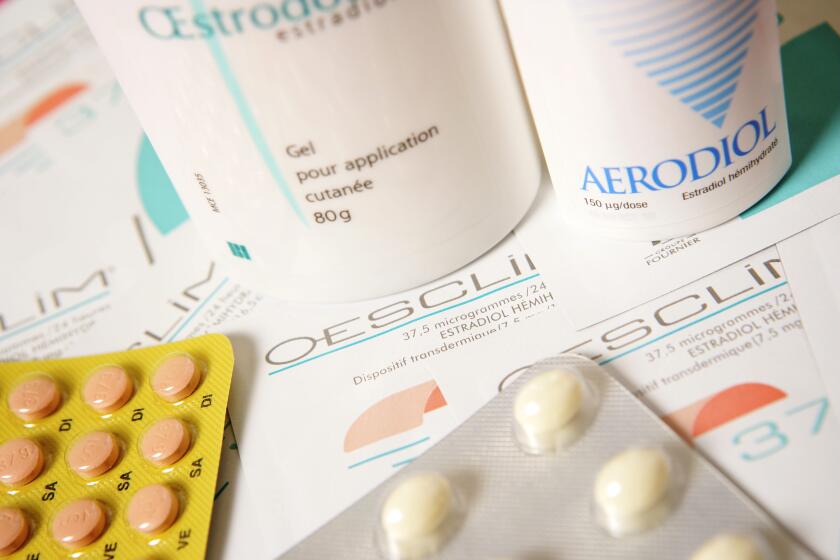Women always had hot flashes at work. Now they’re done hiding menopause

Natalia Maureira-Rey was in a meeting with five fellow lawyers in Spain this May when she suddenly started to sweat.
“These hot flashes with menopause, it’s unbelievable,” Maureira-Rey, head of North America corporate legal affairs for Spanish retail group Inditex , said to the colleague sitting closest to her. The woman just stood up and walked away. After a few minutes, she returned and handed Maureira-Rey a beautiful Spanish fan. “It really helps,” the colleague told her.
As more senior women start to speak up about what can be a taboo experience of going through menopause, it’s heralding a shift — albeit slowly — across U.S. companies. A growing number of employers are offering or planning to introduce specific menopause benefits for their staff, keen to shrink the $26.6 billion that the U.S. economy alone sheds each year related to employees managing menopause symptoms, including $1.8 billion due to lost productivity and billions more in health expenses.
In a recent analysis of policies at more than 500 companies, 15% of employers said they offer or plan to offer menopause benefits in 2024. That’s up from just 4% last year. Microsoft, Palantir Technologies, and Abercrombie & Fitch are among U.S. businesses that already include menopause-related services in their policies, including access to specialists and educational resources.
At health insurer Blue Cross Blue Shield of Massachusetts, more than 70% of the company’s employees are women, with an average age of 45. Combined with the 2.9 million customers it serves across the U.S., the growth in benefits tied to menopause “is a big part of our business opportunity,” Chief Executive Sarah Iselin told more than 400 employees during a July webinar. In a recording of the session, Iselin shared her personal struggles with common symptoms such as hot flashes and brain fog during her own menopause.
Menopause affects more than half the world’s population. It’s a public health issue that requires the attention of more than a few random celebrities
“It still feels like a taboo topic especially at work, and we want to change that,” she said. “We’re starting with ourselves.”
Iselin wasn’t immediately available to comment beyond the recording.
Maureira-Rey and Iselin are still in the minority when it comes to speaking up about the issue: One recent survey by Carrot Fertility, a health benefits company, showed that only 4% of women in the U.S. have been “very public” about going through menopause. Still, they’re examples of a growing cohort of women who are likely to be experiencing physical and emotional changes just as they ascend to senior roles across corporate America — the average age for menopause in the U.S. is 52, according to the Menopause Society, a nonprofit organization that also publishes a medical journal on the topic. The average age of newly appointed CEOs last year was just under 54 , recruiter Spencer Stuart found.
Research shows a link between symptoms related to both menopause and perimenopause — the stage when a woman’s period becomes more irregular, which can start as early as 35 — and a hit to career progression: One in five senior executives said their symptoms had a negative impact on being hired for a role, while 31% said their bonus payouts were affected, according to consulting firm Korn Ferry. The numbers were much lower for women in less senior roles.
Those who do speak out hope to set off a chain reaction that raises awareness and destigmatizes a process that even many women don’t know that much about. For Maureira-Rey, it was also important to share her experience in part so colleagues understood her brain fog and mental exhaustion were tied to hormonal fluctuations, not her motivation or abilities. She said she spoke openly to her male boss about what she was going through, and once announced her hot flash to a full conference room during a panel discussion.
“You’re in this great place in your career, but you’re feeling all of these symptoms,” said Maureira-Rey, 48. “I said to myself, ‘Either I can let these folks think whatever they want to think, or I can show up as myself and let them know it’s OK.’”
In recent years, even celebrities have jumped on the bandwagon of normalizing menopause. Courtney Cox, Michelle Obama and Drew Barrymore all have gone public with their experiences. And some are learning it’s a big business opportunity — according to at least one estimate, the global menopause market is estimated to hit $24.4 billion in 2030. When Naomi Watts opened up about her own journey of experiencing early menopause in her thirties, the confession came alongside the launch of her line of menopause wellness products Stripes in 2022. It’s a popular theme for Gwyneth Paltrow too, whose company Goop has hosted hormone summits and sells its own line of themed supplements called “Madame Ovary.”
Gwyneth Paltrow gathered the Gooperati in Santa Monica to talk menopause and hormones, which have become the boogeyman in women’s wellness.
Women’s health
In the last decade or so, many U.S. companies have come around to recognizing women’s health issues in the workplace, making menstrual products available in restrooms and assigning lactation rooms for breastfeeding mothers. Dr. Stephanie Faubion, medical director of the North American Menopause Society, said the changes give her some confidence that employers will eventually normalize menopause.
In consultation with other physicians at the Menopause Society, she plans to publish this summer the group’s first set of recommendations that address menopause in the workplace, which will be aimed at educating companies, managers and employees as well as medical professionals. Small steps such as giving individual controls over the thermostat to counter hot flashes, or offering employees more frequent breaks, are a move in the right direction, she said.
“A lot of it can dovetail into existing policies,” said Faubion, who gave an example of tweaking existing mental-health benefits to make clear that they encompass any psychological challenges tied to menopause. Education is also important, she said.
“Women can’t complain or report symptoms if they don’t even know what they’re related to,” said Faubion, who’s also the director of the Mayo Clinic Center for Women’s Health. Many patients with common menopause symptoms such as night sweats, weight gain around the hips and stomach, vaginal dryness, heart palpitations and anxiety have come to see her, worried that something is “seriously wrong,” she said.
The government should spread information about and expand access to hormone therapy, the best option for most of the 55 million Americans in menopause.
Faubion said that more companies have been asking her to come speak to employees about menopause.
Several months after her colleague gifted her the fan, Inditex’s Maureira-Rey said she noticed a female executive from a vendor fanning herself with a small piece of paper during a meeting in Washington, D.C. When the meeting ended, Maureira-Rey gave the woman her fan. “I know what you’re going through,” she said, “and it sucks!”
The woman smiled. “We need more people to understand,” she said.
More to Read
Inside the business of entertainment
The Wide Shot brings you news, analysis and insights on everything from streaming wars to production — and what it all means for the future.
You may occasionally receive promotional content from the Los Angeles Times.













